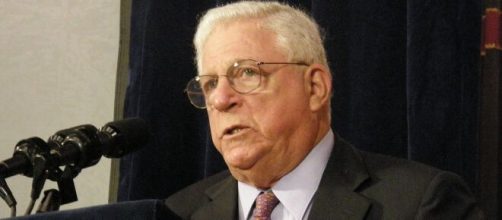Richard Ravitch held a variety of jobs during the course of his professional career. Many, if not most of them would heavily involve trying to navigate through one or more crises along the way.
Ravitch was not always a politician in the traditional sense. But he was a member of the Democratic Party. He made a try to become New York City's mayor, unsuccessfully. Later, he served briefly as New York State's second-highest-ranking government official.
Passed away on June 25, 2023
Richard Ravitch has died at the age of 89. He had been hospitalized in Manhattan.
But the exact cause of death was not immediately released to the public. Ravitch passed away Sunday, less than two weeks before his 90th birthday.
Current New York Governor Kathy Hochul said Ravitch "was a steady, savvy, and brilliant leader." Adding that he was "a public servant in the truest sense of the term."
After serving in the United States Army, Ravtich took on civilian government work. He became a staffer with what was then the Government Operations Committee of the United States House of Representatives. He joined his family's construction business after other roles with New York State and City.
U.S. President Lyndon B. Johnson appointed him to commission on urban issues in 1966. Two years later, Ravitch was chosen as the new Citizens Housing and Planning Council president.
Later, Governor Hugh Carey named him the New York State Urban Development Corporation chairman. At the time, the corporation was nearly insolvent. Ravitch would be credited with saving it.
In 1979, Carey tapped Ravitch to become the head of the Metropolitan Transportation Authority. The MTA was another institution that was facing dire straits at the time of his appointment. Ravitch implemented a number of reforms and helped create the Metro-North Railroad. Not all of his policies went over well with everybody involved. New York City transit workers went on a high-profile strike in 1980. During this time, Ravitch received death threats.
Ravitch's next salvage mission came as chair of the Bowery Savings Bank, which had long been losing money.
In part, he created an investment group with members, including Warren Buffett and Laurence Tisch, to take over the bank. The move was a success. Profitability was restored, and Bowery was purchased by H.F. Ahmanson & Co. Around this time, Ravitch joined the American Stock Exchange Board of Governors.
Eventually became the lieutenant governor
In 1989, Richard Ravitch was a candidate for mayor of New York City. He finished in a distant third place in the Democratic primary. Behind Manhattan Borough President and eventual general election winner David Dinkins and incumbent Mayor Ed Koch.
A couple of years later, the team owners of Major League Baseball hired Ravitch. His purview was to be MLB's lead negotiator in labor dealings with the Major League Baseball Players Association.
His tenure in this particular role did not go very well. Culminating in the 1994 strike led to the cancellation of that year's World Series. The Players Association placed much of the blame for the strike on Ravitch and his negotiating tactics. He would resign his position towards the end of the year.
Shortly after, Republican New York City Mayor Rudy Giuliani chose Ravitch as head of the city's school system. But he would in time, withdraw his name from consideration. In 2000, Ravitch was named a Congressional Millennial Housing Commission co-chair. The other co-chair was former Republican New York U.S. Representative Susan Molinari.
Eight years later, New York Governor Eliot Spitzer resigned in disgrace.
Lieutenant Governor David Paterson was elevated to become the new governor. The following year, Paterson appointed Ravitch as the new lieutenant governor.
Paterson and Ravitch later fell on bad terms over budget differences. But neither would be long for the respective offices. Paterson was not a candidate for a full gubernatorial term in 2010. Nor was Ravitch selected for a full term as lieutenant governor.
Afterwards, Ravitch was less in the public spotlight. His co-chairing the State Budget Crisis Task Force with former Federal Reserve Chairman Paul Volcker was an exception.


